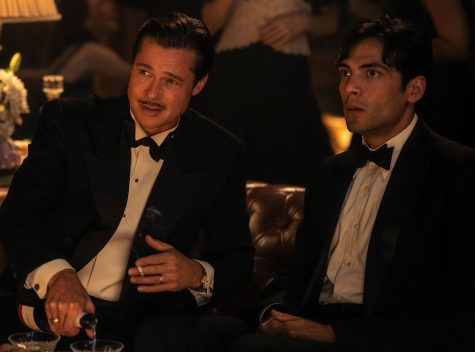‘Babylon’ is impressive but will not stand the test of time
If you have indulged yourself in the polarized discourse surrounding Damien Chazelle’s Babylon, you have probably run into comparisons to Paul Thomas Anderson’s Boogie Nights (1998). While I do not wish to beat a dead horse, this comparison is with good reason. Both are sprawling entertainment industry epics, one portraying a seedier side than the other, and the faces, rising and established, that get lost in the shuffle of transitioning industries. In the case of Boogie Nights, it is the world of pornography in the ’70s and ’80s and its transition from cinematic films to trashy VHS. In the case of Damien Chazelle’s Babylon, it is Hollywood in the ’20s and ’30s and its transition from silent film to sound.
Their similarities are not solely skeletal either. A defining scene in Babylon’s dwindling final act serves as a rehash and seemingly a direct ode to Alfred Molina’s iconic drug deal scene in Boogie Nights. The comparison is not unfounded. It seems as if an inspired Chazelle had gone down a checklist of what made Boogie Nights what it was: a period piece, behemoth runtime, ensemble cast of intertwining characters, an exciting rise to stardom, drugs, sex, egos, and a sobering downwards-spiral. Yet beyond all these grandiose features that make both Babylon and Boogie Nights enthralling viewings, Chazelle forgets what made Boogie Nights an impactful film; a film that has a shelf-life in the viewer’s heart and mind long after the credits have rolled and the dust has settled: complex characters.
Throughout Babylon’s hefty 189-minute-long runtime, Chazelle peppers his Old-Hollywood epic with a handful of different players at different positions. At the forefront of its ensemble are the three central protagonists: Manuel Torres (Diego Calva), a Mexican immigrant with filmmaking aspirations, working as a lackey for Hollywood parties in the meantime; Nellie LaRoy (Margot Robbie), a confident New Jersian with indestructible ambitions of stardom; and Jack Conrad, the most tenured of the bunch, a well-intentioned and highly paid but troubled film star.
Babylon’s opening scene sees Manuel hauling an Elephant to a party. As he and his coworkers are tediously pushing it along a mountain path, the Elephant defecates uncontrollably onto everyone. It is the perfect litmus test for whether Babylon’s toilet humor will land with you; for me, it fell flat more often than not.
Directly following Babylon’s opening scene is the film’s most memorable sequence, an intricately-designed 20-minute party sequence laced with all kinds of obscene debauchery. This is where our three protagonists first cross paths and when their trajectories alter irreversibly. Manuel Torres, smitten with love at first sight, permits an uninvited Nellie LaRoy to enter the festivities. They snort cocaine and share their Hollywood fantasies. Fortunately for Nellie, she is in the right place at the right time: an actress who was essential for a film shoot the next day overdoses. An irritated studio manager chooses Nellie at random to fill in and she strikes while the iron is hot.
Our apt introduction to Jack Conrad sees his wife threatening to divorce him if he does not stop drunkenly uttering Italian. It is Jack Conrad that is the man to give Manuel his first opportunity. Manuel is tasked with assisting a wasted Jack Conrad to get home safely. Jack takes a liking to Manuel’s work ethic and efficiency and offers him a job as his right-hand man on set.
That night sparks a golden age of fulfilled dreams and financial prosperity for these three. Jack Conrad continues to bask in his stardom, retaining his reputation as the most valuable actor in Hollywood. Nellie LaRoy seizes her opportunities and becomes the most sought-after actress. Manuel Torres proves himself to be a valuable administrative figure, as his excellent decision-making steadily lifts him up the studio hierarchy. However, as you could likely predict, these times do not last forever. As cinema gains a sense of sound, unaccustomed actors Nellie LaRoy and Jack Conrad fail to adapt and find their footing in Hollywood crumbling. Their detrimental egos and impulsive vices for drugs, alcohol, and gambling steepen their downward spirals. Although Manwell Torres remains rational in his behavior and secure in his executive position, it is his devotion to Nellie that is the catalyst for his downfall. He is constantly left cleaning up after her carelessness until her mishaps begin to jeopardize his livelihood.
By any means, Babylon is an engaging rise-and-fall epic. Nonetheless, when it is compared to and contextualized alongside its predecessors and influences, namely Boogie Nights, the cracks in its depth begin to show. Babylon’s characters are paper-thin in their complexity. Brad Pitt gives the finest performance in Babylon with Jack Conrad, a typical over-the-hill figure we have endured countless times. While it is compelling, it is certainly not unique. Manuel Torres (Diego Calva) is a sufficient audience surrogate that keeps the film grounded, yet I found his character underwritten and fleeting in weight. Nellie LaRoy (Margot Robbie) is loathsome, which thwarted her emotional beats in the final act. To fully understand why this cannot work you must look at the Boogie Nights blueprint Chazelle has used and its protagonist Dirk Diggler (Mark Wahlberg).
Both characters share the same catalysts for their downfalls. Their newly found fame inflates their egos and their judgment blurs as they intoxicate more and more. However, for all of his faults, Dirk Diggler never loses grip of his rationality as drastically as Nellie does. Meanwhile, Nellie LaRoy is completely imbalanced. The fame directly turns her into a juvenile, impulsive, and reckless person with few redeeming qualities to find salvation in. Nothing about her is endearing. There is only ever one dimension to her character, no profound depth to grasp.

In spite of its imposing stature, Babylon fails to leave any substantial footprint in the larger picture. The problem is not that Chazelle was influenced by Boogie Nights. Boogie Nights itself was even influenced by Goodfellas (1990) structurally. Yet Boogie Nights spun its influence and weaved a masterpiece of its own. Chazelle on the contrary did not contribute anything of his own to the formula, diluting it if anything. No iconic characters birthed, a scarce amount of memorable scenes, and shoddy pacing; it is a mere shell of greater movies.
It is not a question of if Damien Chazelle is capable. Terrence Fletcher (J.K Simmons) from his breakout film Whiplash (2014) remains one of the most morally fascinating film antagonists of the 21st century. But as Chazelle’s budgets have expanded, his attention to the finer aspects of his craft has shrunk. The finely-crafted claustrophobic thrill of Whiplash has earned it its era-defining classic reputation despite its modest setting.
Whiplash was Damien Chazelle’s breakthrough, La La Land cemented his status, but his latest efforts First Man (2018) and Babylon have been falters in his trajectory. The future of Damien Chazelle in Hollywood is uncertain. Whiplash and La La Land (2016) will be discussed ten years from now, and probably another ten years after that. Babylon will not.

Sam Dababneh is a Junior at Niles North High school. This is third second year on North Star News. Read additional writing on samdababneh.com.







Courtney Hanson • Feb 12, 2023 at 4:37 pm
Sam,
What a great review! I love your comparison to Boogie Nights-a film ultimately about desperation. Now, I’m even more curious about Babylon after reading your review.
Thank you SAM!